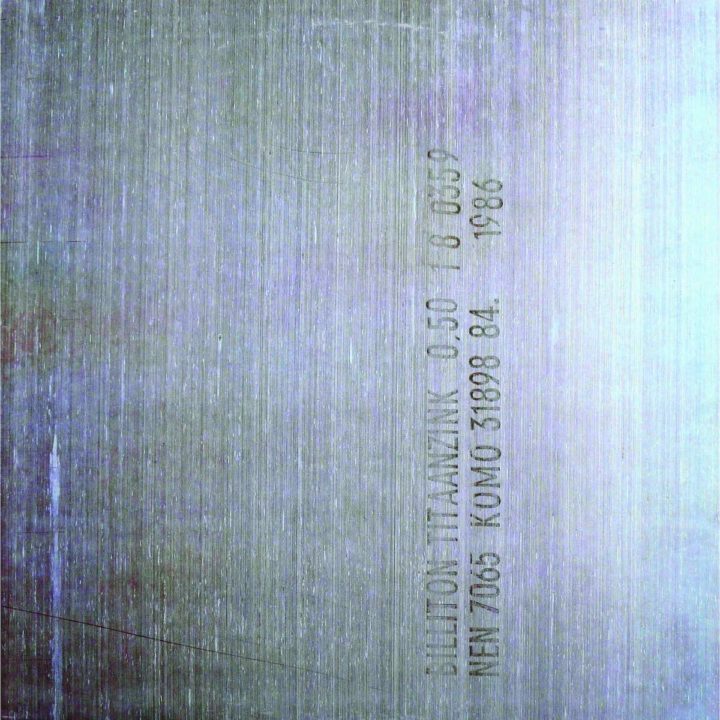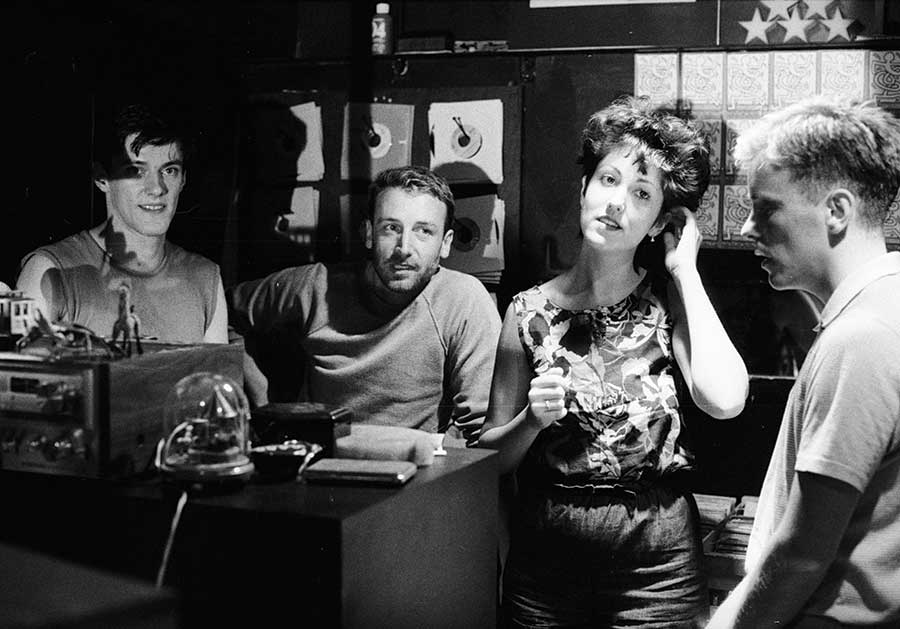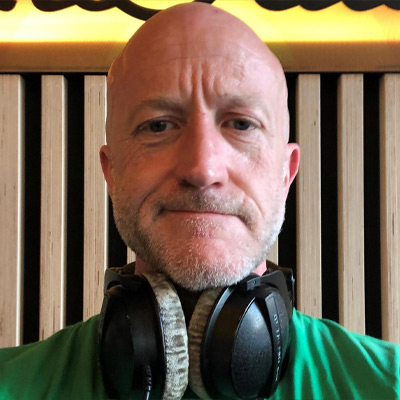
New Order’s fourth studio album would see the band split their rock and electro-pop influences over the LP’s two sides. the resulting record, while not being exactly a fan favourite, would birth one of their most enduring songs – Bizarre Love Triangle…
Released at the end of September 1986, Brotherhood was something of a transitional album for New Order. Conceptually divided into two halves of ‘rock’ and ‘electronic’ sides, with one set of songs veering towards synths and the other offering a guitar-based scenario.
While the idea wasn’t bad, in retrospect it made Brotherhood sound schizophrenic and a little uneven, something that Stephen Morris himself considered “didn’t quite work”.
Peter Hook believed that “It was here that the rock/electronic split started to surface,” he recalled. “Ever the punk at heart, I loved the guitar-based material and loved it when we played together.
But the others preferred the more sequencer-led tracks. In the end, the divide was so pronounced that we ended up having the guitar-based tracks on Side One and the more electronic songs on Side Two.”
The beauty of New Order was the combination of these things and their ability to cohesively marry each – possibly opposing – force and both sides of their personality, and the division of the tracks in such a way split fans.
No one was forced to take sides, but the old school Joy Division-heads enjoyed the indie-r rock tracks and the newer set preferred the synths. Perhaps a reswizzle of the running order would’ve helped to make it a solid venture.
As it was, Brotherhood on the whole isn’t terrible by any means, but it’s rarely any fan’s favourite New Order album, if far from the worst.
If anything, it was the album that consolidated their position in the US, nestled between Low-Life and Technique, newer fans would eventually see the artistic development across the three.
There were also constraints on the band, now signed to Warners in America, on Quincy Jones’ Qwest imprint, who were breathing down the band’s neck to knock out a follow-up to Low-Life as soon as possible.
“Warners were keen for a speedy follow-up,” claimed Morris in his memoir, Fast Forward, “and we were writing, rehearsing and recording at a rate which today seems impossible.”
- Read more: Album By Album – New Order
However, as it turned out, this was a fortuitous demand on behalf of Warners, as Brotherhood arrived just at the time New Order’s stock began to rise across the Atlantic, after the inclusion of Shellshock on the Pretty In Pink soundtrack, as well as a vast US tour that took the band across the country right up until Christmas.
“The idea was to capitalise on our growing US popularity, which we did,” Hook reflected in his book. “We wanted to behave like a regular band by doing a regular long tour, and indeed it turned out to be the zenith of our touring career… Brotherhood set that up for us.”
Nevertheless, the quartet spent spring in London’s Jam Studio, before heading off to Windmill Lane in Dublin, which had had a hand in most of U2’s output up until 2000, when they were based there. “The sessions went well… we had a huge flat near Hyde Park,” recalled Hook.
The album was engineered by Michael Johnson, who was also responsible for their last two albums, Power, Corruption & Lies and Low-Life. Johnson reflected on this period to Sound On Sound: “We worked on backing tracks and a couple of vocals at Jam Studios, London, over a period of six weeks.
“Then we booked two weeks in Windmill Lane Studios, Dublin, to do vocals and overdubs but we had to extend it to three weeks in the end.
“We finished off mixing the album in Amazon Studios, Liverpool. The way we work is that the band produce themselves but allow me quite a lot of say in choosing what is put down on tape and how.
“They record all their stuff, initially, on a 4-track Teac 3340 in their rehearsal studio in Manchester, where they jam for hours. Then, in the studio, this is listened to for good ideas.
“With Brotherhood four songs were totally finished by the time they came into the studio – Bizarre Love Triangle, Weirdo, All Day Long and As It Is When It Was.”
Johnson had become used to New Order’s method of recording by this point, and the somewhat unusual set-up the band would have in the studio: “Barney doesn’t like recording in the normal way, i.e. using headphones – he likes to do all his vocals in the control room.
“He used a very cheap Beyer handheld stage mic on Brotherhood which didn’t sound brilliant, but he was relaxed while recording, which is more important. Peter Hook’s bass on this was very hissy, originally.
“The phasers and pre-amplification he uses to make his bass sound create a lot of hiss on the tape, and if you rub it out you get rid of a lot of his sound as well. I just put a mic in front of his amp and recorded what came out.”
The speed of recording allowed plenty of time for the band to experiment.

Photo by Kevin Cummins
“We also worked hard in Jam to get the lead guitar lines to sound as Ennio Morricone [the film composer] as possible – and even threaded washers on the guitar strings to give us a more metallic sound, like we did on [Low-Life’s] Sunrise,” remembered Hook, who also remarked that Sumner then headed to Liverpool’s Amazon studios to mix the tracks that made up the album’s second side.
“Barney later worked on the mix… harder than I had ever seen him work before. He wanted the production to be just right.”
Brotherhood was maybe slightly baffling not just for the mood division, but also being home to one of the band’s greatest singles.
Bizarre Love Triangle ranks among their top numbers, and the long list of cover versions of the track are testament to the song, but in the UK it did precisely bugger all (well, it ended up at No.56, which a bit of a disaster in the grand scheme of positions, following up the Top 30 success of Shellshock and State Of The Nation).
It did, however, reach the Top 5 on Billboard’s US Hot Dance Music/Club Play Singles chart and also went Top 5 in Australia.
“Bizarre Love Triangle became New Order’s greatest miss,” Morris remarked in his book, “An absolutely perfect pop record if ever there was one. It had a brilliant video, again by Michael Shamberg, and always sounded fantastic live.
“I’m particularly proud of my Emulator playing on that one. Today it’s up there with everyone’s favourites, but in 1986 it was a damp squib. A thing that baffles me to this day.”
As Sumner remembered to Smash Hits: “The title was inspired by the News Of The World. I was reading it one Sunday and thinking how ridiculous it was – especially the headline, ‘Saucy Vicar Caught In Bizarre Love Triangle’ and thought, ‘We’ll call our new song that!”
The story of the album’s other key track is actually a little bizarre. The closer, Every Little Counts, seems a bit of a daft throwaway compared to the rest of Brotherhood, but almost as a release after all the pressure the band were under in trying to get the album finished.
Said Sumner: “Yeah, well the album was… really hard work, we wrote 70 per cent of it in the studio, and we got to this last song and I started singing it dead serious but when I got to that line about a pig, well, it just sounded ridiculous and I burst out laughing. We could have done it again but we thought, fuck it, it works as it is.”
- Read more: Classic Album: New Order – Republic
As for the title itself, Brotherhood was decided on by each member putting names in a hat, and the one with the most votes winning.
Bernard said at the time, mischievously that, “Democracy can be a little tricky when all members have different ideas. We can never agree on a title, which is why some of them end up really boring.”
As Hook puts it: “Despite the divide between the acoustic and electronic songs, I’m still fond of it. When I listen to it now, I’m positive that [the rock songs] on side one have weathered the years better, yet the songs on Side Two are now my favourites!”
The critical reaction to Brotherhood at the time was mixed: Steve Sutherland at Melody Maker offered a word salad of, “Infuriatingly enigmatic, every song strains between adrenalised instrumental passages of thundering majesty and lyrics of such embarrassing openness that the listener is repeatedly frustrated and forced to impugn motives to their apparent schizophrenia. Is this tension between frailty and fury a callous formula or shivering naked naivety? I can’t decide.”
Sumner told Sounds at the time of release that “Because I’m so melancholy I suppose I’m always unhappy with everything we’ve done. I don’t like the production on Brotherhood… we’ve got Rolls Royce songs crammed inside Cortina bodywork.”
But he later recalled to Uncut that, “It’s not as good as Low-Life. I remember going on holiday to Corfu, playing it on a Walkman and thinking, ‘Fucking hell, that’s shit.’”
Gillian, however, is more direct, telling Uncut, “I don’t like the songs as much as our others. I don’t like the sleeve. I don’t like the name.”
Brotherhood, then. An album of two sides (quite literally) whose rushed process to deadline in order to break them in America worked. Neither a masterpiece but by no means terrible.
- Read more: New Order interview: Power, Corruption & Lies
- Read more: New Order – the later years
New Order: Brotherhood – the songs
Paradise
With two vocal lines coming in at the same time, it’s a duelling of voices on this poppy opener to the album, and as Peter Hook – memorably high up with his six-string bass line – said on a Twitter Listening Party: “The Jolene part was indeed inspired by Dolly Parton – we’d been listening to a lot of country music.” It would have been a great single too.
Weirdo
This is prime New Order, despite the wonky metaphors of the lyrics – “Just like the ocean or the sea/ Just like the blood that burns in me/ Someone like you cannot be free”. It could be about someone who was lost to drugs or joined a cult. It’s very much a live favourite from the time.
As It Is When It Was
Something of a breather after the clatter and bang of the opening pair, as Hook revealed on the Listening Party: “This is one of my favourites and another bassline that I’m very proud of. Lovely intro by Barney on the acoustic guitar. Back to the 6-string for this one. Mike Johnson, our studio engineer, did a really great job recording my bass.”
Broken Promise
Over to Hooky again for his inside info: “This is a really fast one – great intro with the bass and guitar. I think this is my son’s favourite bassline of mine. We actually also used to play this as Revenge, Pottsy liked singing it. All this music was written before the vocals.” Broken Promise also feels like a relapse back to Joy Division – never too far from New Order for obvious reasons – about the guilt after someone dies.
Way Of Life
Way Of Life was issued as a promotional 12” in the US, looking like it was likely to have become a single in that territory. “I really wanted to get another bass riff that was as good as Age Of Consent,” said Peter Hook. “I managed it here by turning that riff backwards and using it again. Distorted bass intro. We got that by putting it through an Akai cassette player!” One of New Order’s little Easter eggs was the intro to Love Will Tear Us Apart popping up towards the end.
Bizarre Love Triangle
The non-monster hit of Brotherhood. Something that defined the album, albeit the only official single from it. Bizarre Love Triangle went through a myriad of versions, having been played on the road long before they recorded it. Known as both ‘Broken Promises’ or even ‘Broken Guitar Strings’ at various points, it was recorded specifically to open the ‘electronic’ second side of the album. “We used to take our song titles from many different places – books, TV, anything we saw that sounded good we would write down and use at a later date. That’s why a lot of our songs have titles that are completely separate to the lyrics.”
All Day Long
New Order’s lyrics had been fairly oblique and abstract, but during this period things started to come into more focus and State Of The Nation’s lyrics – ‘So don’t tell me about politics/Or all the problems of our economics/ When you can’t look after what you can’t own/ You scream and shout all day long’ – are much more pointed. Hooky remarked that “Barney was certainly more interested in this side of the LP but these songs actually have less vocals? Interesting.” All Day Long also had elements of Richard Wagner’s Prelude to Das Rheingold, which the band would use as an intro tape.
Angel Dust
A little bit of discordancy to remind people that the band hadn’t fully gone pop, opening with a Middle Eastern prayer call, Angel Dust is an industrial number filled with gunshots, distortion, brash piano, thrash guitar and the sort of drum programming that allowed Morris to have a right old riot. The band issued it in a remix called Evil Dust as part of a CDV (video CD) release of True Faith although it had previously been part of a compilation called Funky Alternatives pitched alongside tracks by DAF, Chris & Cosey and 23 Skidoo.
Every Little Counts
As Hooky said: “The lyrics to this song were done at 5am at the end of a long session in Ireland, when everyone had just had enough.” The song was inspired by Lou Reed’s classic 1972 track, Walk On The Wild Side, and as Johnson recalled, was painstakingly pieced together: “It was very long originally, so it had to be restructured, and the extra piece at the end was one of Gillian’s ideas. The song had to fit together like a jigsaw puzzle.” The ending came from Bernard pressing every key on his Emulator to create an almighty racket, before a scratched vinyl effect ends the album abruptly. Morris later said: “What we should have done is make the tape version sound like the tape getting chewed up. The CD could have the sticking sound.”
State Of The Nation
Inspired by the band’s Japanese translator, who claimed that any groupies who’d follow the band around were actually ‘the shame of the nation’, which New Order thought was funny and adapted to use for a remix of the song. With State Of The Nation, however, a little confusingly, the ‘Shame’ version was featured on the expanded edition of Low-Life. It was also released in some territories as the B-side of Bizarre Love Triangle. To confuse matters further, State Of The Nation was actually released a week before Brotherhood, and ended up being added to the CD version.
- Want more from Classic Pop magazine? Get a free digital issue when you sign up to our newsletter!
Classic Pop may earn commission from the links on this page, but we only feature products we think you will enjoy.


